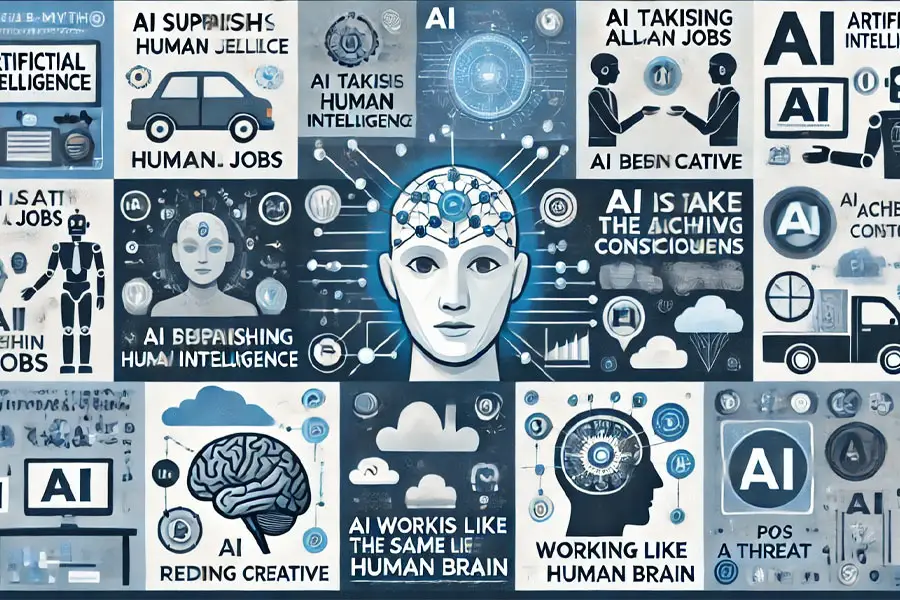Hey there! Have you ever heard about Artificial Intelligence, or AI for short? You might have seen it in movies or read about it in books. AI is a cool technology that makes machines, like computers, learn and make decisions. But there are a lot of myths, or “stories that aren’t true,” about what AI can and can’t do. Let’s bust some of these myths together!
Myth #1: AI Will Take Over All Jobs!
Some people worry that AI will take away everyone’s jobs. But guess what? AI helps with tasks that are super repetitive, like organizing information or doing math quickly. Jobs like teaching, counseling, and creative designing require a human touch. So, while some tasks might change, people will always be needed!
Myth #2: AI is Smarter Than Humans
Even though AI can solve problems fast, it’s not as smart as humans! Right now, AI can only do specific tasks, like recognizing faces or playing games. But it can’t do everything that humans can, like imagining, understanding emotions, or making new discoveries.
Myth #3: AI Has Feelings Like Us
You might have seen robots in movies that look and act like they have feelings. But in real life, AI doesn’t feel emotions. It’s just a machine following instructions. It doesn’t get happy, sad, or mad like we do.
Myth #4: AI is Always Right
AI systems learn from data, but they’re not perfect. Sometimes, they make mistakes, especially if the data is wrong. That’s why humans are still needed to check things and make sure AI works properly.
Myth #5: AI Will Rule the World Someday
AI isn’t going to take over the world like in sci-fi movies. AI machines don’t think for themselves—they just follow instructions from programmers. People create rules and limits to control what AI can and can’t do, so no need to worry!
Myth #6: AI is Only for Big Companies
AI isn’t just for huge companies like Google or Amazon. Even small businesses use AI! For example, some stores use AI to help recommend products to their customers, and smaller businesses use chatbots to answer questions online.
Myth #7: AI Can Work All by Itself
Some people think that AI can do everything alone, but it still needs humans! Even though AI can help with certain tasks, humans need to give it the right instructions and check its work, especially for important things like healthcare.
Myth #8: AI Will Replace People in Every Job
AI might replace certain tasks, but not entire jobs. Many jobs need creativity, problem-solving, and personal connections, things only humans can do. For example, being a teacher, a nurse, or an artist involves skills that AI can’t match!
Myth #9: AI Thinks Like a Human
AI can learn patterns, like recognizing pictures or translating languages, but it doesn’t actually “think.” It doesn’t understand what it’s doing. For instance, when AI helps you with homework by suggesting answers, it’s using patterns but doesn’t know if it’s right or wrong.
Myth #10: AI is Just a Fad and Will Go Away Soon
AI has been around for a long time and will keep evolving. It’s becoming an important tool in many areas, like medicine, transportation, and education. So, AI isn’t going anywhere—it’s here to stay and grow with us!
Wrapping It Up!
So, there you have it! AI is a powerful tool that helps us in many ways, but it’s not as magical or scary as some myths make it seem. Humans are still in control, and AI is here to make life easier, not to take over. With the right knowledge, we can work with AI to make the world a better place!
Frequently Asked Questions (FAQs)
1. Can AI really replace all jobs?
Nope! While AI can handle repetitive tasks, many jobs need human creativity, empathy, and problem-solving skills.
2. Does AI have feelings?
No, AI doesn’t have feelings. It follows instructions and makes decisions based on data, but it doesn’t “feel” anything.
3. Can AI learn on its own?
AI can learn patterns from data, but it doesn’t understand what it learns like humans do.
4. Will AI take over the world like in the movies?
Nope! AI follows human-made rules and limitations, so it’s not going to take over the world.
5. Is AI just a trend?
No, AI is here to stay! It’s already helping in various fields and will continue to improve our lives in the future.

